Daily Vocabulary Words: Enhance Your Lexicon with Leading Newspapers & Publications
Welcome to the Daily Vocabulary section at Wordpandit!
Our mission is straightforward: to bring you essential vocabulary words featured in top newspapers and publications worldwide. By focusing on words you’ll encounter in renowned sources, we aim to help you enhance your vocabulary effectively and practically.
Our selection includes words from:
– The New York Times
– The Washington Post
– Scientific American
– BBC
– The Guardian
– Psychology Today
– Wall Street Journal
– The Economist
– The Hindu
– The Times of India
– The Economic Times
– Hindustan Times
– Live Mint
– The Indian Express
– And many more.
We are committed to your vocabulary development. Simply visit this section regularly and explore the daily posts. This is your go-to repository for commonly used words, providing significant practical benefits by familiarizing you with vocabulary from the leading publications listed above.
Make it a habit to visit our website daily and expand your lexicon with words from top newspapers and publications.
Word 1- Austerity
Context- Harsh austerity programme as prescribed by the International Monetary Fund
Source- The Hindu
Explanatory Paragraph: Imagine you have a piggy bank, and you love buying toys and candy. But one day, your parents say, “We need to save all our money and only buy important things like food.” That’s called “austerity.” It means being very careful with money and only spending it on things that are truly needed.
Meaning: The practice of strict and careful spending, avoiding any extra or unnecessary expenses (noun).
Pronunciation: aw-STEH-ri-tee
Synonyms: frugality, thriftiness, economy, simplicity, restraint, severity, plainness
Usage Examples:
1. The family adopted austerity measures to save money for the future.
2. During hard times, the country had to embrace austerity and cut back on spending.
3. The school’s austerity plan meant fewer new books and no extra programs.
4. Austerity often means giving up fun things to make sure important needs are met.
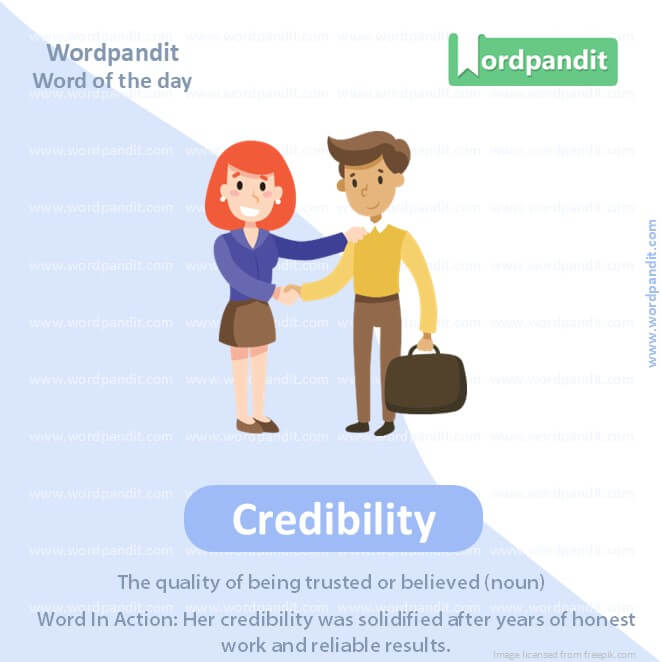
Word 2- Credibility
Context- The issue of corruption will be a crucial test of the new President’s political success as well as his credibility.
Source- The Hindu
Explanatory Paragraph: When someone always tells the truth and does what they say, people trust them. That trust is called “credibility.” It’s like having a gold star for being honest and reliable!
Meaning: The quality of being trusted or believed (noun).
Pronunciation: kred-uh-BIL-i-tee
Synonyms: trustworthiness, reliability, believability, dependability, integrity, authenticity
Usage Examples:
1. The scientist’s research gave her credibility in the academic world.
2. His honesty earned him a lot of credibility with his friends.
3. The news channel lost credibility after reporting fake stories.
4. Building credibility takes time but can be lost quickly with one lie.
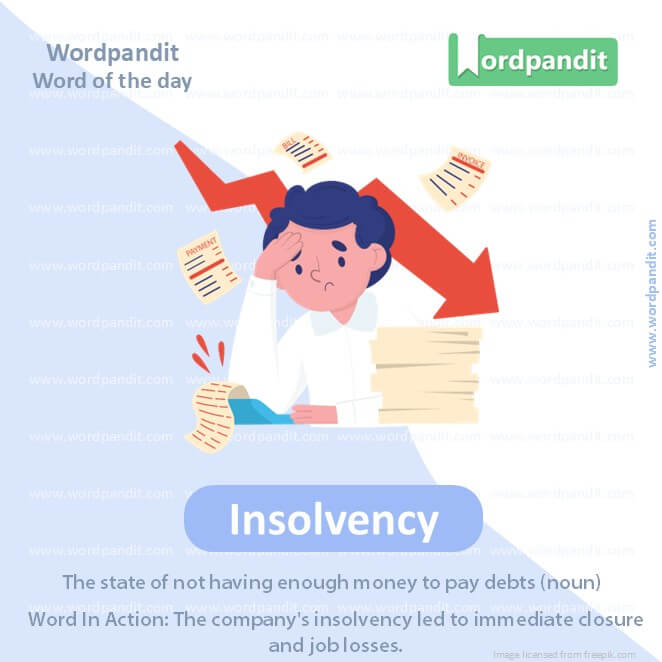
Word 3- Insolvency
Context- There is a need to integrate perspectives on the importance of insolvency laws.
Source- The Hindu
Explanatory Paragraph: Imagine if you wanted to buy a toy but didn’t have any money left, not even a single coin. That’s like “insolvency” for a company or a person—it means they don’t have enough money to pay what they owe.
Meaning: The state of not having enough money to pay debts (noun).
Pronunciation: in-SOL-ven-see
Synonyms: bankruptcy, failure, ruin, financial distress, default, collapse
Usage Examples:
1. The company declared insolvency after being unable to pay its debts.
2. Insolvency can happen when someone spends more money than they have.
3. Many businesses faced insolvency during the economic crisis.
4. Insolvency forced the family to sell their home.
Word 4- Ramifications
Context- Considering the reality of insolvency with cross-border ramifications
Source- The Hindu
Explanatory Paragraph: Imagine if you knock over a stack of blocks, and all the blocks fall down and make a mess. The mess is a result of knocking over the first block, and that’s what “ramifications” means—it’s the consequences or results of an action.
Meaning: The effects or consequences of an action or event, especially when they are complex or unwelcome (noun).
Pronunciation: ram-uh-fi-KAY-shuns
Synonyms: consequences, effects, outcomes, repercussions, results, impacts
Usage Examples:
1. The teacher explained the possible ramifications of not studying for the exam.
2. Breaking the rules can have serious ramifications for the whole class.
3. The new law has wide-ranging ramifications for businesses.
4. The ramifications of his decision were felt by everyone in the family.
Word 5- Illegitimate
Context- Causing losses to the firm to the tune of about ₹81.3 crore through illegitimate payments
Source- The Hindu
Explanatory Paragraph: If someone says they have the right to take your toy, but they don’t really have permission, that’s “illegitimate.” It means something isn’t right or doesn’t follow the rules.
Meaning: Not authorized or lawful (adjective).
Pronunciation: il-lih-JIT-uh-mit
Synonyms: unlawful, illegal, invalid, unauthorized, improper, false
Usage Examples:
1. The king’s power was challenged by an illegitimate claim to the throne.
2. They found out the document was illegitimate and not valid in court.
3. The business was shut down for illegitimate practices.
4. The police arrested the man for his illegitimate use of public funds.
Word 6- Bogus
Context- To bogus human-resource consultants
Source- The Hindu
Explanatory Paragraph: Imagine someone tries to give you a toy, but it’s broken and doesn’t work like they said it would. That’s “bogus.” It means something is fake or not what it’s supposed to be.
Meaning: False or not real (adjective).
Pronunciation: BOH-gus
Synonyms: fake, false, phony, counterfeit, fraudulent, sham
Usage Examples:
1. The store sold bogus products that didn’t work as advertised.
2. He used a bogus excuse to avoid doing his chores.
3. The police arrested the man for using a bogus ID.
4. Many people were scammed by the bogus website.
Word 7- Inflated
Context- Inflated and undue payments through pass-through vendors
Source- The Hindu
Explanatory Paragraph: Imagine you have a balloon, and you blow it up until it’s way too big! That’s what “inflated” means—when something is made to seem bigger, more important, or more valuable than it really is.
Meaning: Increased beyond what is normal or true (adjective).
Pronunciation: in-FLAY-ted
Synonyms: exaggerated, overstated, enlarged, bloated, excessive, puffed-up
Usage Examples:
1. The company’s inflated prices made it hard for customers to afford anything.
2. His inflated opinion of himself annoyed his classmates.
3. The value of the car was inflated to make it seem worth more than it was.
4. She gave an inflated version of the story to impress her friends.
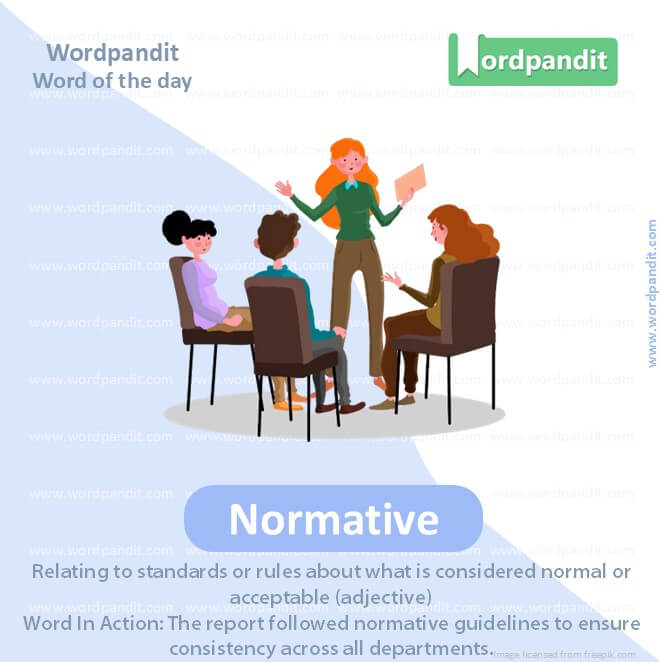
Word 8- Normative
Context- The issue that the PIL raised is a normative one that goes beyond Israel
Source- The Hindu
Explanatory Paragraph: “Normative” is like when everyone agrees that something is the right or normal way to do things. It’s about following the usual rules or standards.
Meaning: Relating to standards or rules about what is considered normal or acceptable (adjective).
Pronunciation: NOR-mah-tiv
Synonyms: standard, usual, typical, customary, expected, conventional
Usage Examples:
1. The teacher explained the normative behavior expected in class.
2. Normative rules in society guide how people should act.
3. In some cultures, it’s normative to greet with a bow.
4. Wearing uniforms is normative at their school.
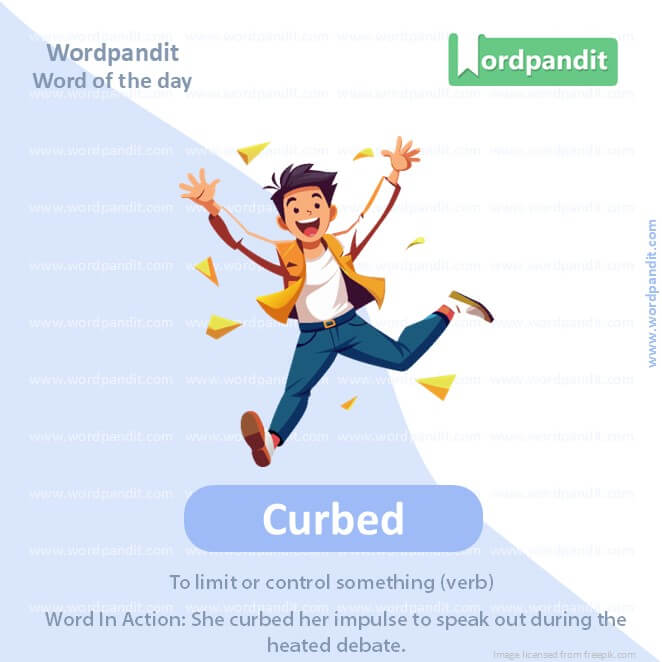
Word 9- Curbed
Context- Quite a few countries have curbed defense exports to Israel
Source- The Hindu
Explanatory Paragraph: If you want to eat lots of candy, but your parents say you can only have one piece, they “curbed” your candy-eating. It means they stopped you from doing too much of something.
Meaning: To limit or control something (verb).
Pronunciation: kurbd
Synonyms: restrained, limited, controlled, reduced, restricted, checked
Usage Examples:
1. The government curbed spending to avoid debt.
2. She curbed her excitement until the surprise was revealed.
3. They curbed the dog’s behavior with training.
4. His parents curbed his screen time to only one hour a day.
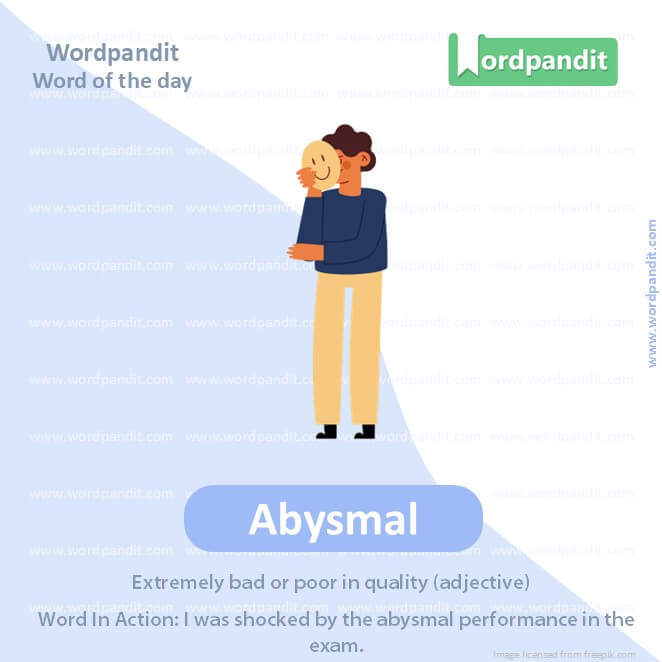
Word 10- Abysmal
Context- Women’s labor force participation is abysmal, hovering around 25%
Source- The Hindu
Explanatory Paragraph: If something is really, really bad—like trying to build a tower of blocks and it falls down right away—that’s “abysmal.” It means something is awful or terrible.
Meaning: Extremely bad or poor in quality (adjective).
Pronunciation: uh-BIZ-mul
Synonyms: terrible, awful, dreadful, horrible, appalling, dire
Usage Examples:
1. The team’s performance in the game was abysmal.
2. His grades were abysmal after he stopped studying.
3. The movie received abysmal reviews from critics.
4. The conditions in the old building were abysmal.













